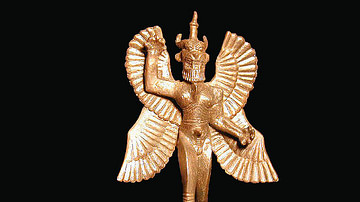Search
Search Results

Article
Protagoras's Paradox
The sophists in ancient Greece were a class of teachers who, for a fairly high fee, would instruct the affluent youth in politics, history, science, law, mathematics and rhetoric as well as the finer points of grammar and history. They professed...

Article
Geme-Suen v Ur-Lugal's Wife - A Court Case in Ancient Mesopotamia
During the 21st century BCE, an era known as the Ur III period in Mesopotamia, many records of court hearings were drawn up in Umma, a city in what is now southern Iraq. One court record relates a dispute between two women. The name of one...

Article
Twelve Menacing & Protective Mythological Figures
The term mythology comes from the Greek words mythos (“story of the people”) and logos (“word”) and so is defined as the spoken (later written) story of a culture. Modern scholars have divided myths into different types which serve many different...

Article
The Egyptian Cinderella Story Debunked
The story of Cinderella is one of the most popular in the world. In the west, it has enjoyed a continuous following since its revision and publication by Charles Perrault in 1697 CE but the tale of the young heroine, unjustly forced into...

Article
Pherenike the Female Olympic Trainer
Pherenike (l. c. 388 BCE, also known as Kallipateira) was an athlete from Rhodes who, because she was a woman, could not compete in the Olympic Games and, as a married woman, was not allowed to even watch them. Defying these rules and risking...

Definition
Ancient Egyptian Religion
Egyptian religion was a combination of beliefs and practices which, in the modern day, would include Egyptian mythology, science, medicine, psychiatry, magic, spiritualism, herbology, as well as the modern understanding of 'religion' as belief...

Definition
Cronus
In Greek mythology, Cronus (also spelt Kronos) is a Titan and the youngest son of Uranus (Heaven/Sky) and Gaia (Earth). He dethroned Uranus and became the world's first king, ruling over his siblings and fellow Titans. Cronus married his...

Definition
Ancient Greek Tragedy
Greek tragedy was a popular and influential form of drama performed in theatres across ancient Greece from the late 6th century BCE. The most famous playwrights of the genre were Aeschylus, Sophocles, and Euripides and many of their works...

Video
Cham Dance at Spituk Monastery, Ladakh
Cham dance or the dance of Buddhist Lamas wearing elaborate masks is a treat to watch. This video was shot at Gustor Festival of Spituk Monastery located near Leh in Ladakh region of Jammu & Kashmir. Buddhist Cham Dance is a ritual dance...

Video
The History of Valentines Day: From the Lupercalia to Cupid
Before chocolates, roses and letters from your valentine were given on Valentines Day, there was the Ancient Roman Festival of the Lupercalia in honour of both the agricultural god Luperca and the she-wolf who sucked Romulus and Remus, Lupus...